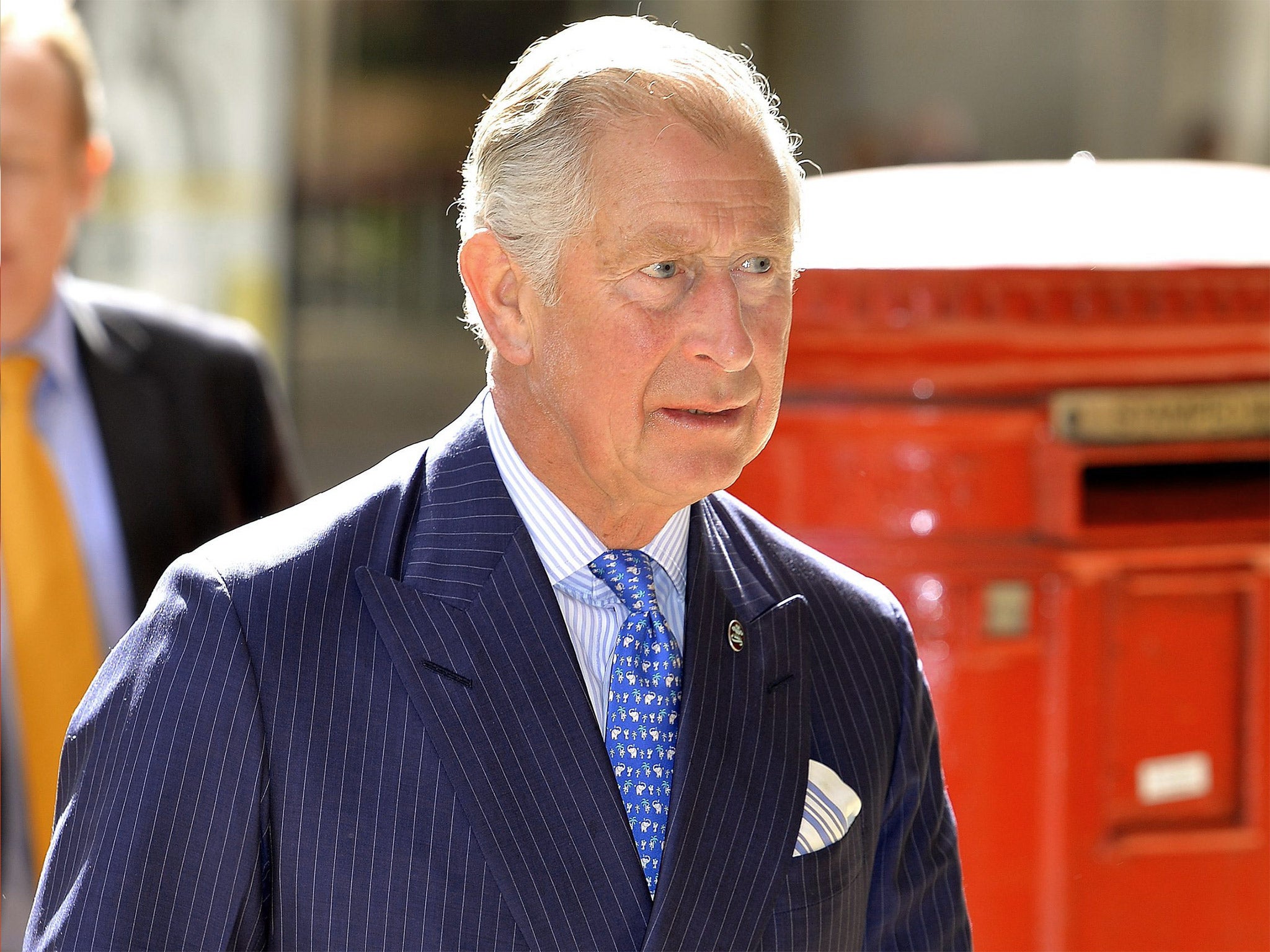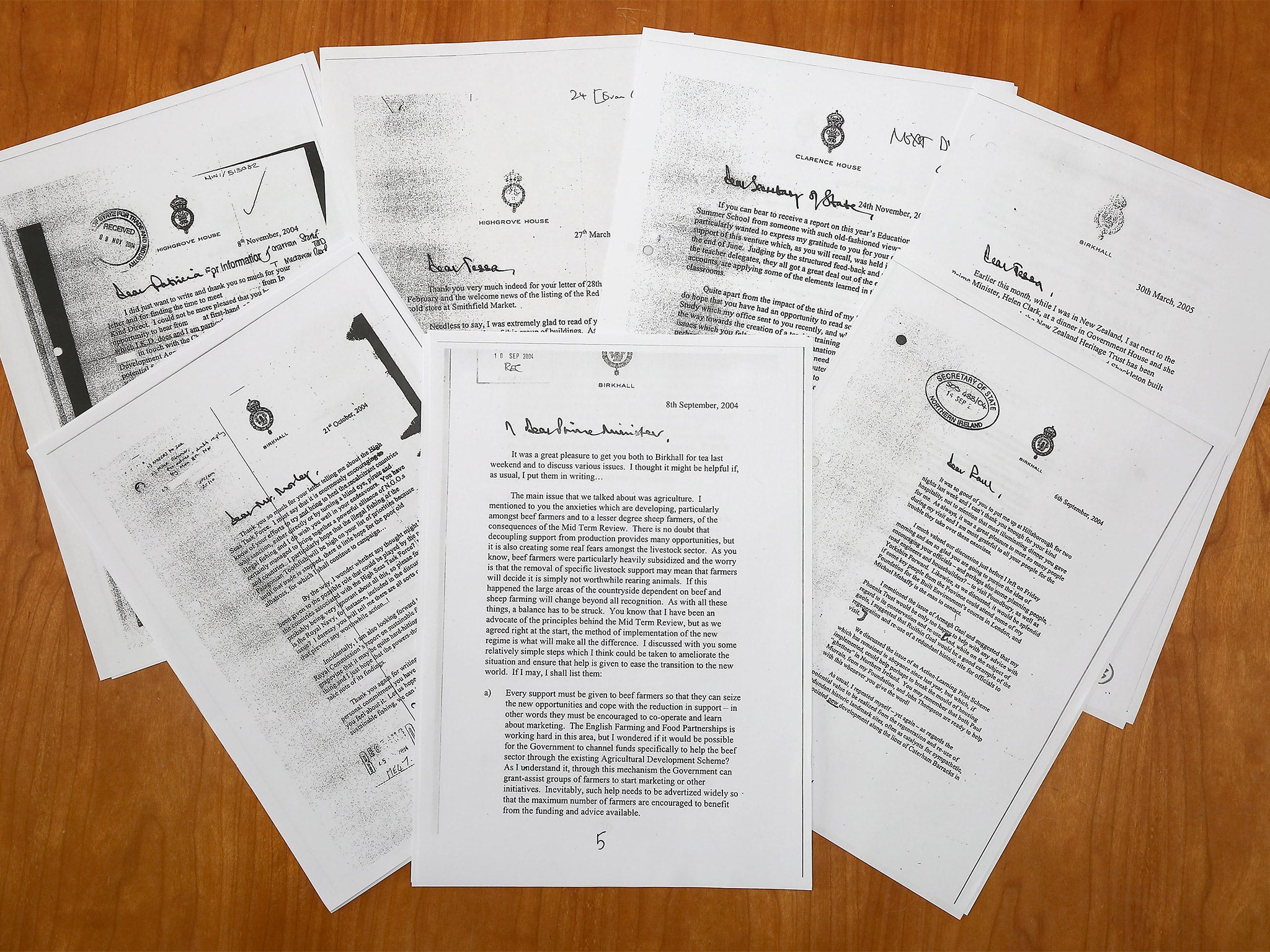Prince Charles 'black spider' letters published: After 10-year legal battle memos finally reveal the extent of royal 'meddling'
The letters will raise renewed concerns over his suitability as king

The willingness of Prince Charles to put direct pressure on ministers to change government policy on the basis of his personal beliefs was laid bare last night in a series of letters released after a decade-long secrecy battle.
The 10 missives sent by the heir to the throne to Tony Blair and several of his most senior ministers in 2004 and 2005 reveal how Charles extracted promises of action on his long-standing obsession with complementary medicine and accused the Labour government of failing Britain’s soldiers in Iraq.
The letters, which have been released after a 10-year legal tussle with The Guardian costing taxpayers an estimated £400,000, will raise renewed concerns about the likely attitude of the self-confessed “meddler” prince to the elected executive when he eventually becomes king.
Aides floated the idea last year that in contrast to his mother’s studied silence on all political matters, Charles will continue to make “heartfelt interventions”.
In the letters, written between September 2004 and April 2005 during Mr Blair’s second term, the prince adopts a no-nonsense tone with ministers, imparting advice on issues from appointments to public roles to the plight of the Patagonian toothfish, and lobbying for action in areas from school meals to the provision of military equipment.
The last government refused to release the correspondence – amounting to 24 letters comprising 10 written by the prince with replies from ministers and officials – on the basis that to do so would undermine Charles’s “position of political neutrality”. The Supreme Court ruled in March that they had been unlawfully withheld.
Despite their nickname of the “black spider memos” based on the Charles’s handwritten scrawl, they are all typewritten with an occasional note from the prince apologising for the length of a particular missive.
Clarence House insisted the letters did not amount to an attempt unduly to influence the government of the day but represented the prince offering his “unique perspective” on multiple issues based on his own knowledge and that of individuals he meets in the course of his royal duties.
Earlier in the day the prince had refused to answer questions about the letters from journalist Michael Crick as he was visiting the headquarters of Marks & Spencer. After ignoring Mr Crick, Charles was heard to remark: "Very predictable."

The documents nonetheless highlight how the prince is prepared to use his position to make requests of the nation’s most powerful politicians.
In some cases, the letters appear to provoke immediate action. Mr Blair replied to a request from the prince for measures to tackle a European Union directive restricting certain herbal medicines by offering a six-year delay on its implementation.
In another exchange with Mr Blair in late 2004, Charles used the issue of the performance of Lynx helicopters being used by British troops in Iraq to suggest that the Government was sending soldiers into battle ill-equipped.
Graham Smith, chief executive of Republic, said: “The Government must act to end royal secrecy. Any risk to the monarchy from disclosure must pale against a risk to democracy from having an activist prince acting in secret.” Others, however, said the letter showed the prince was in tune with the public mood on many issues.
The Conservative MP Michael Ellis said: “He is a good man and this is transparent from the letters. He is passionate about a number of issues... he is making gentle suggestions. I think many people including the Armed Forces themselves will be impressed that he is engaged.”
Revealing Language
“You kindly suggested that it would be helpful if I put them [the issues] in writing – despite the Freedom of Information Act!”
Prince Charles to Tony Blair (Feb 2005)
“I apologise for the length of this letter!”
Charles to Blair (Feb 2005)
“I urge you again to look at introducing a proper cull of badgers where it is necessary. I, for one, cannot understand how the ‘badger lobby’ seems to mind not at all about the slaughter of thousands of expensive cattle, and yet object to a managed cull of over-population of badgers.”
Charles to Blair (Feb 2005)
“Finally, you raised the issue of milk.”
Blair to Charles (Feb 2005)
“As ever, I found your points ... thought-provoking.”
Blair to Charles (Oct 2004)
“I have the honour to remain, Sir, your Royal Highness’s most humble and obedient servant.”
John Reid, Health Secretary (and former Communist student), to Charles (Oct 2004)
“I particularly hope that the illegal fishing of the Patagonian Toothfish will be high on your list of priorities, because until that trade is stopped, there is little hope for the poor old albatross, for which I shall continue to campaign.”
Charles to Elliot Morley, Environment Minister (Oct 2004)
“I need hardly say, apologies for pestering you about so many things.”
Charles to Paul Murphy, Secretary of State for Northern Ireland (Sept 2004)
Join our commenting forum
Join thought-provoking conversations, follow other Independent readers and see their replies
Comments